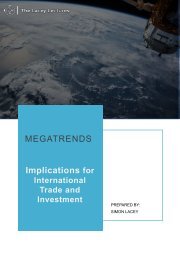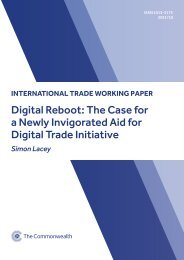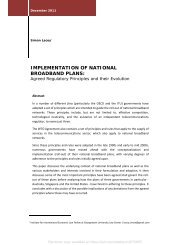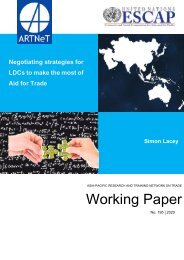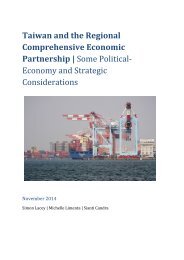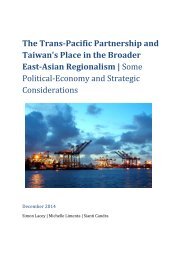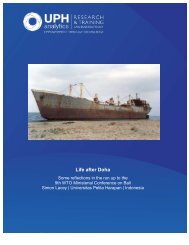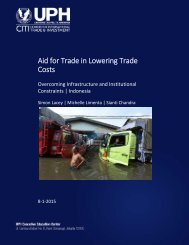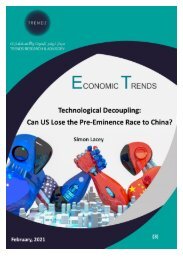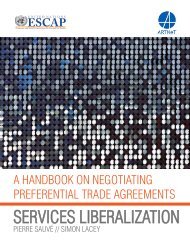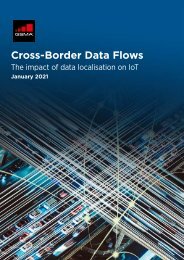White Paper Trade Rules and the Digital Economy Key Points and Findings
This synopsis document summarizes and articulates the key points and findings from the much longer 2017 White Paper on Trade Rules for the Digital Economy.
This synopsis document summarizes and articulates the key points and findings from the much longer 2017 White Paper on Trade Rules for the Digital Economy.
- No tags were found...
Create successful ePaper yourself
Turn your PDF publications into a flip-book with our unique Google optimized e-Paper software.
Huawei | <strong>Trade</strong> <strong>and</strong> <strong>the</strong> <strong>Digital</strong> <strong>Economy</strong> | <strong>White</strong> <strong>Paper</strong> <strong>Key</strong> <strong>Points</strong> <strong>and</strong> <strong>Findings</strong><br />
4 Huawei has much to contribute to this dialogue<br />
Precisely because of our size, <strong>the</strong> breadth of our activities <strong>and</strong> <strong>the</strong> extent of our reach, we at Huawei are<br />
uniquely positioned to offer insights into what rules are likely to contribute towards an optimal trade<br />
regime for <strong>the</strong> digital economy. In addition to <strong>the</strong>se attributes, we at Huawei are fortunate to count among<br />
our 170,000+ employees, dedicated experts on global trade rules based in Shenzhen as well as in important<br />
regional trade‐policy capitals such as Brussels <strong>and</strong> Washington DC. We are in a position <strong>and</strong> at a unique<br />
moment in time where we can provide thought leadership on <strong>the</strong>se important emerging issues.<br />
5 Huawei's interests are broadly aligned with <strong>the</strong> rest of <strong>the</strong> global ICT industry<br />
We at Huawei are deeply entrenched in global digital value chains <strong>and</strong> have long been working closely with<br />
suppliers, partners, customers <strong>and</strong> o<strong>the</strong>r stakeholders in many countries, <strong>and</strong> across many different<br />
product <strong>and</strong> services markets within <strong>the</strong> digital economy. As such, we are undeniably a significant part of<br />
<strong>the</strong> global ICT industry, <strong>and</strong> our prospects rise <strong>and</strong> fall in conjunction with <strong>the</strong> general welfare of <strong>the</strong> global<br />
ICT industry as a whole. This means that what’s good for <strong>the</strong> global ICT industry <strong>and</strong> for <strong>the</strong> digital economy<br />
is almost certain to be good for Huawei, <strong>and</strong> what’s bad for <strong>the</strong> global ICT industry <strong>and</strong> <strong>the</strong> digital economy<br />
in general is likely not going to benefit Huawei ei<strong>the</strong>r. As <strong>the</strong> saying goes: “a rising tide lifts all boats” <strong>and</strong><br />
this saying is very applicable when it comes to policies, measures <strong>and</strong> trade rules that have an impact on<br />
trade flows in <strong>the</strong> digital economy.<br />
6 We all win in a world where <strong>the</strong> internet is global, open <strong>and</strong> accessible<br />
Disproportionately restrictive policies enacted for protectionist purposes or without taking into account<br />
<strong>the</strong> realities of <strong>the</strong> global internet are likely to create negative externalities both within <strong>and</strong> beyond <strong>the</strong><br />
borders of <strong>the</strong> authorities that enact <strong>the</strong>m. In <strong>the</strong> same way, trade rules that promote an open, accessible<br />
<strong>and</strong> global internet promote <strong>the</strong> exchange of ideas, grant open access to <strong>the</strong> latest ideas <strong>and</strong> innovation<br />
<strong>and</strong> provide a global public good that benefits <strong>the</strong> whole ICT industry <strong>and</strong> all players in <strong>the</strong> digital economy,<br />
including Huawei.<br />
7 Governments must <strong>and</strong> will remain <strong>the</strong> arbiters of <strong>the</strong> public policy exception<br />
Huawei recognizes <strong>and</strong> is completely supportive of <strong>the</strong> very important role governments can <strong>and</strong> must play<br />
as watchdogs <strong>and</strong> overseers of <strong>the</strong> public interest. We also recognize that governments must act when<br />
doing so is required to safeguard legitimate public policy interests. However, like many in <strong>the</strong> industry, <strong>and</strong><br />
as governments have recognized in fora like APEC, <strong>the</strong> OECD <strong>and</strong> <strong>the</strong> G20, <strong>the</strong> invocation of public policy<br />
exceptions should be done in good faith <strong>and</strong> subject to certain agreed limiting principles, such as<br />
proportionality, least‐trade restrictiveness of measures, <strong>and</strong> <strong>the</strong> effectiveness of any measures taken in<br />
achieving <strong>the</strong> purported public policy objectives for which <strong>the</strong>y were imposed<br />
21




